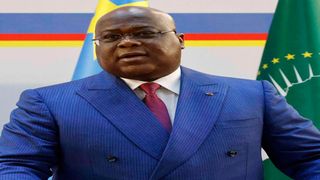
Democratic Republic of Congo's President Felix Tshisekedi addressing media.
| AFPNews
Prime
UN peacekeeping reforms open door for DR Congo funding
The Democratic Republic of Congo’s regional peace bid could begin tapping into a UN peacekeeping fund as early as January next year if the UN Security Council gives the nod, boosting chances of an alternative conflict resolution for the troubled country.
The move, lobbied by the East African Community, is part of reform discussions for a new format UN Peacekeeping management across the world, and targets to support more locally led inititatives. It is based on lessons learnt from the departing UN Stabilisation Mission in the Congo (Monusco).
It will require a UN Security Council endorsement by end of December but has already been backed by the African Union Peace and Security Council, which also argues for a redirection of UN funding to needy urgent cases of conflict in Africa.
Though deployed in 2010 to replace an older UN peacekeeping mission known as MONUC, which had been deployed in 1999, critics of Monusco charge that it has been largely ineffective, as atrocities mounted in the eastern DRC. And Kinshasa has led citizens in protests, sometimes violent, against Monusco, seeking its early departure.
“The acceleration of the withdrawal of the Monusco becomes an imperative necessity to ease tensions between the latter and our fellow citizens,” Congolese President Felix Tshisekedi told the UN General Assembly in New York. “The peacekeeping missions deployed, in one form or another for 25 years, have failed to tackle the rebellions and armed conflicts which are tearing the country apart.”
Learning from past
The departure of Monusco, however, will create a void that the EAC wants to fill, by learning from Monusco’ s mistakes, according to EAC Secretary-General Peter Mathuki.
The EACRF currently has 4,229 troops in eastern DRC and has its mandate until December, too. And whether it continues its stay in DRC will depend on two things: Permission from Kinshasa and funding from the UN.

South African peacekeepers from the United Nations Organization Stabilisation Mission in Congo (MONUSCO) standing on a hillside position above the village of Remek, in Masisi territory of the Democratic Republic of the Congo's North Kivu province in 2012.
“When we met the UN Security Council (last week in New York), we discussed a number of issues. One, we have proposed funding the EACRF, and the Security Council said they are meeting in December to determine how much they can draw down from Monusco (budget) and how much they will be able to get to fund the EACRF,” Dr Mathuki told The EastAfrican.
“The budget for Monusco is huge. And if the EACRF can get a fifth of that… We are spending close to almost $4 million or more per month on troops. We need our troops to be sustainable and given the financial support.”
The EAC requested more than $250 million annually to help support the few troops and expand or double the number should the UN head to their call.
“Based on our discussion, we see a possibility of increasing the number, possibly to double or three times because the place that the EACRF is supporting is limited and we are seeing a situation that if Monusco leaves without a proper cover then it means the EACRF number has also to increase and that in essence is a huge budget,” Dr Mathuki said.
Certainty for the DRC’s peace mission, however, will rely on how the world responds to the work of the UN-AU Joint Task Force on Peace and Security. It met for its 22nd Consultative Meeting held on September 18 to 21 in New York.
Guaranteed support
Ethiopian President Sahle-Work Zewde told the UN Security Council that only a guaranteed financial support can help end conflicts on the continent.
“It is also essential that the issue of predictable and sustainable financing for AU peace operations authorised by the Security Council is – on a case-by-case basis – framed within the context of a mutually agreed political strategy, and informed by joint analysis,” she said.
Since 2016, Security Council members have debated the idea of using UN assessed contributions to fund African-led operations on a case-by-case basis. In fact, the UN Commission itself was formed in 2005, the presumptive date when calls for reforms gathered pace. But now officials say they have gained ground, with the US, one of the initial opponents of the idea, loosening up for it.
The Security Council’s three African non-permanent members (Ghana, Gabon and Mozambique) pushed hard for the Council to agree on a framework for future UN-AU funding arrangements by the end of 2023.





